Iranian official posts image that appears to depict a nuclear strike on Israel
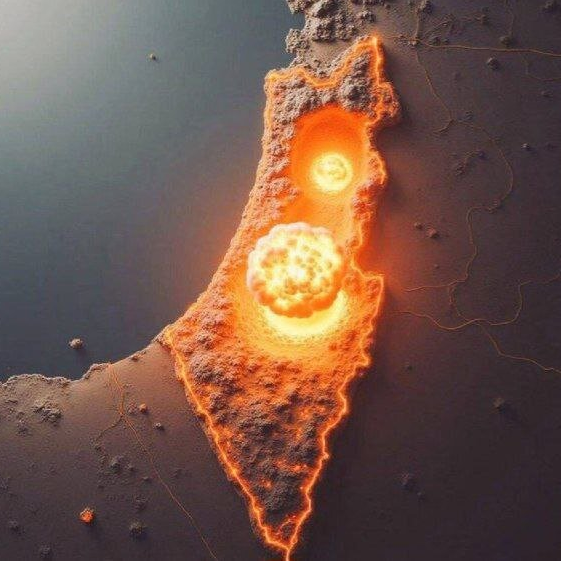
An advisor to Iran's parliament speaker has shared an image that seems to show a nuclear attack on Israel.

An advisor to Iran's parliament speaker has shared an image that seems to show a nuclear attack on Israel.
Mehdi Mohammadi, a strategic adviser to Mohammad-Bagher Ghalibaf, posted the image in an Instagram story on Saturday.
The image showed a map of Israel with two mushroom clouds positioned over its territory—an iconography widely recognized as symbolizing atomic blasts.
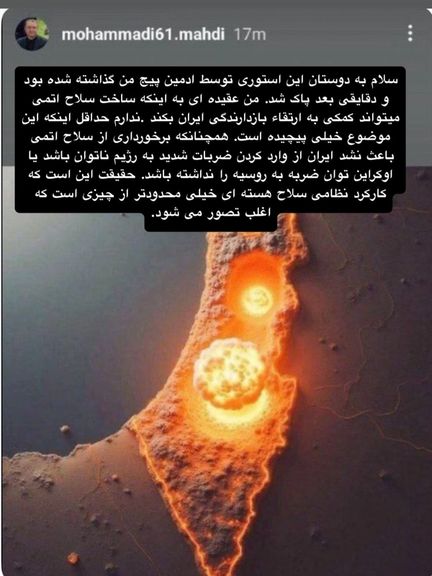
A few hours later, Mohammadi posted a second Instagram story seeking to clarify his position.
“Hello friends,” he wrote. “That story was posted by the admin of my page and was deleted a few minutes later. I personally do not believe that developing nuclear weapons would enhance Iran’s deterrence. At the very least, it’s an extremely complex issue."
"Just as possessing nuclear weapons hasn’t prevented Israel from receiving heavy blows, or enabled Ukraine to strike Russia decisively, the military utility of nuclear arms is far more limited than most people imagine,” he added.
Iran continues to deny any ambition to acquire nuclear weapons, dismissing international concerns as politically driven.
Last month, American airstrikes targeted major Iranian nuclear facilities at Fordow, Natanz, and Isfahan. The attacks came after days of Israeli campaign against Iran where the Jewish State used cruise missiles and deep-penetration bombs to damage infrastructure and affiliated military units.
In October, a group of lawmakers called on Iran's Supreme National Security Council to review the country's defense doctrine and consider adopting nuclear weapons.
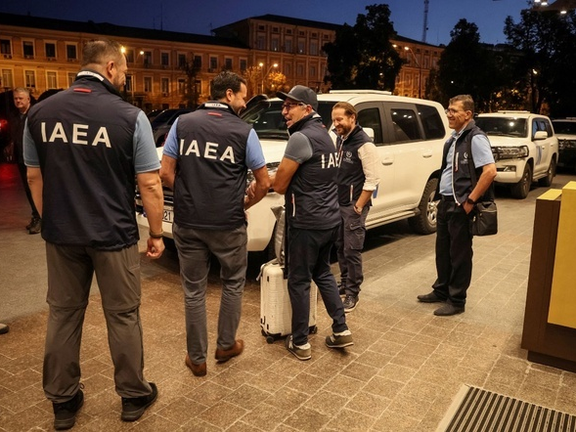
A senior Iranian lawmaker on Saturday accused International Atomic Energy Agency (IAEA) inspectors of hiding surveillance microchips in their shoes during visits to Iran’s nuclear sites.
"Why is it that every time these inspectors enter our nuclear facilities, and we conduct body checks, we find microchips in their shoes?" the deputy chairman of the parliament’s National Security and Foreign Policy Committee said.
"It is a fact, not a slogan, that these inspectors are spies," Mahmoud Nabavian said in remarks published by Fars News Agency.
He accused the UN nuclear watchdog of repeatedly passing classified information to foreign governments. "How did Iran’s nuclear installations, such as those in Natanz, become known to the outside world?"
“They know because they are told—by their satellites, their spies, and the agency itself,” he added.
Nabavian said IAEA Director General Rafael Grossi had directly shared Iranian data with Western states. "Even now, they themselves admit all our main statistics and information are given to them by Mr. Grossi.”
Iran’s parliament in late June approved a bill to suspend the country’s cooperation with the IAEA, less than a day into a ceasefire with Israel following 12 days of deadly war.
Parliament members also criticized the IAEA and Grossi, accusing the agency of providing “false reports, politically biased behavior, and facilitating espionage against Iran’s nuclear infrastructure.”
The hardliners and Kayhan newspaper, overseen by Iran's Supreme Leader Ali Khamenei, recently called for the arrest and execution of Grossi if he visited Tehran.
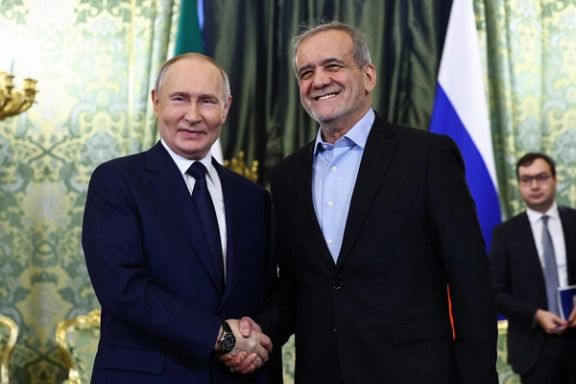
Russian President Vladimir Putin has urged Iranian officials to accept a nuclear agreement that would ban uranium enrichment, a key US demand in any future talks, Axios reported Saturday citing multiple sources.
Putin conveyed his position to both President Donald Trump and Iranian leaders in recent weeks, encouraging Tehran to move toward a deal that would help restart negotiations with Washington.
“Putin would support zero enrichment,” one European official told Axios. “He encouraged the Iranians to work toward that… The Iranians said they won’t consider it.”
Shortly after publication, Iran’s Tasnim News, affiliated with the Revolutionary Guards, rejected the Axios report, citing an informed source.
Moscow has long defended Iran’s right to enrich uranium in public, but behind closed doors, Russian officials have taken a tougher stance following the 12-day war between Iran and Israel, according to European and Israeli officials familiar with the talks cited by Axios.
Despite Iran’s military support for Russia in Ukraine, including drones and missiles, Tehran was frustrated with Moscow’s limited support during the war with Israel, Axios reported.
Russian officials have since told Iran that they would be willing to remove its stockpile of highly enriched uranium and supply low-level fuel for civilian use if a deal is reached.
Araghchi says Iran open to nuclear talks, but enrichment non-negotiable
Tehran has insisted it will not accept any agreement that eliminates its ability to enrich uranium.
Iran is open to future talks over its nuclear program but will not accept any deal that excludes uranium enrichment, Foreign Minister Abbas Araghchi said Saturday during a meeting with foreign envoys in Tehran.
“We have always been ready to negotiate over our nuclear program and will continue to be,” Araghchi said. “But it is natural that we must ensure any future talks are not turned into war by the US or others.”
“No agreement will be accepted without enrichment,” he added. “If talks happen, the subject will only be the nuclear issue.”
Araghchi ruled out any discussion of Iran’s military capabilities. “Iran’s military and defense power will not be part of any negotiation,” he said.
He said Iran’s nuclear facilities were damaged in recent strikes by the US and Israel, but the bigger blow was to the global non-proliferation regime. “The reality is our facilities were hit, but what was hit harder was the Non-Proliferation Treaty itself.”
He added that cooperation with the IAEA would continue but now be managed through Iran’s Supreme National Security Council and reviewed on a case-by-case basis.
Axios also reported that plans to hold US-Iran nuclear talks in Oslo have been dropped after both sides cooled on the idea. They are now seeking an alternative venue, according to the sources cited by the report.
Enrichment ban remains key dispute
Meanwhile, Israeli officials continue to warn against any Iranian enrichment. Former Israeli Defense Minister Yoav Gallant said this week that Supreme Leader Ali Khamenei must abandon nuclear ambitions or face further military action.
“The strikes in June exposed your system and dismantled your capabilities,” Gallant wrote in a public letter.
Israeli Prime Minister Benjamin Netanyahu also dismissed future diplomacy unless Iran ends all enrichment and missile development.
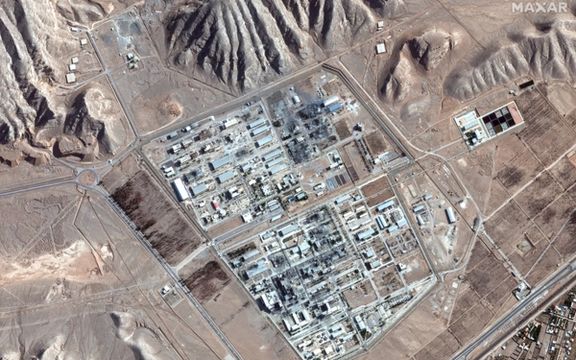
Recent satellite imagery shows Iran has not begun recovery or excavation work at key nuclear tunnel entrances at the Isfahan complex, where enriched uranium is believed to be stored, analysts from the Institute for Science and International Security (ISIS) said Friday.
Images taken on July 9 show that all three tunnel entrances at the Isfahan Nuclear Complex remain blocked by earthen backfill and bomb damage, according to David Albright, the institute’s president, and other researchers.
“To access these stocks, the Iranians would have to dig through and clear about 20 meters of rubble or backfill,” the team wrote. “The July 9 image shows no earth moving equipment or other heavy machinery present at any tunnel entrance.”
The tunnels are suspected of housing parts of Iran’s remaining enriched uranium stockpile, but analysts said that any effort to access them would be highly visible to overhead surveillance and could trigger further US or Israeli strikes.
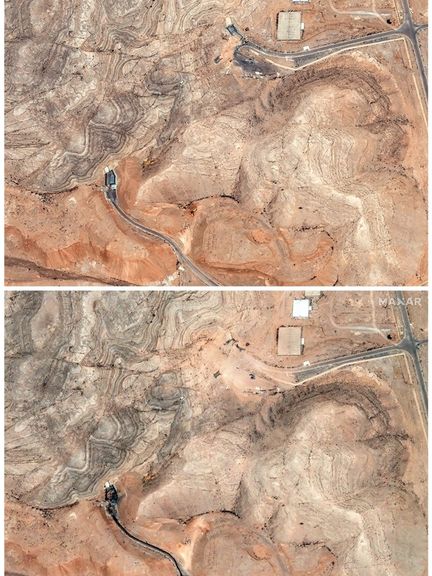
In addition, satellite imagery of the main Isfahan complex — which includes the destroyed uranium conversion and metal production facilities — shows no activity. According to the institute, Iran would likely need to conduct drone or HAZMAT surveys before removing rubble or beginning any rebuilding.
“This is a lengthy and complicated process,” the group said. “Iran may also be holding off on any such activities as they are easily spotted via overhead imagery.”
Israel says Iran did not move 60% enriched uranium before strikes
A senior Israeli official told Reuters this week that Iran did not relocate its 60% enriched uranium stockpile before last month’s US airstrikes on its nuclear facilities at Fordow, Natanz, and Isfahan. The material — estimated at around 400 kilograms — “was not removed and has not been moved since,” the official said.
The official added that while Iran may still be able to reach the stockpile at Isfahan, removing it would be difficult due to the extent of the bomb damage. “The Iranians might still be able to gain access to Isfahan but it would be hard to remove any of the material there,” the official said, according to Reuters.
Before the strikes, the International Atomic Energy Agency (IAEA) had assessed that most of Iran’s 60% enriched uranium was stored at the Isfahan complex. Since the attacks, IAEA inspectors have left the country following a new Iranian law that bars cooperation with the UN watchdog.
Tehran has accused the agency of leaking sensitive information to Israel and the United States and has said future coordination will be managed by its Supreme National Security Council. The IAEA has not been able to verify the location or status of the uranium stockpile since the strikes.
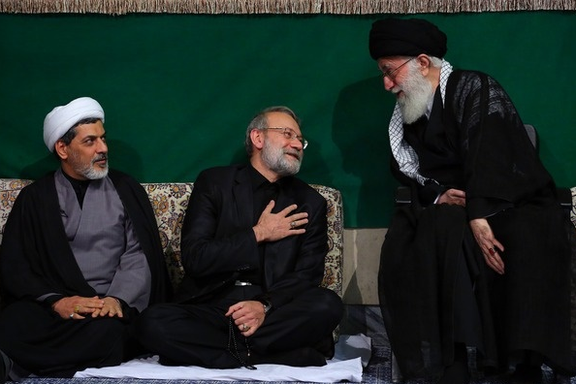
A senior advisor to Iran’s Supreme Leader said that Ali Khamenei triumphed over US President Donald Trump in a 12-day Israel-Iran war capped by US attacks on Iranian nuclear sites, as officialdom doubles down on a victory narrative.
"Under the wise leadership of the Supreme Leader of the Islamic Revolution, we silenced Trump," Ali Larijani, the former Speaker of the Iranian Parliament and current advisor to Khamenei, said on Friday.
Larijani made his remarks during a memorial event for Saeid Izadi, a senior Revolutionary Guards commander killed in an Israeli airstrike in Qom on June 21.
Israel’s Defense Minister, Israel Katz, said on the same day that Izadi had coordinated financial and weapons transfers to Hamas ahead of the October 7, 2023, attacks.
The surprise 12-day campaign killed military commanders along with hundreds of civilians and pounded military and nuclear sites. Iranian missiles killed 27 Israelis.
Tehran officialdom swiftly declared the conflict a victory, in a narrative which jarred many war-weary Iranians.
Donald Trump said on June 27th he personally stopped a final, massive Israeli airstrike on Tehran and had previously alleged the United States was aware of Khamenei's wartime hiding place but had held off killing him.
Larijani condemned Israel’s assassination of Revolutionary Guard commanders inside Iran and said Israeli Prime Minister Benjamin Netanyahu does not understand Iran's culture or people.
In response to comments by Benjamin Netanyahu promoting the joint US-Israel doctrine of "peace through strength," Larijani said: "You made so much noise claiming Hamas and Hezbollah have been eliminated, but Hamas is still alive and continues to carry out operations."
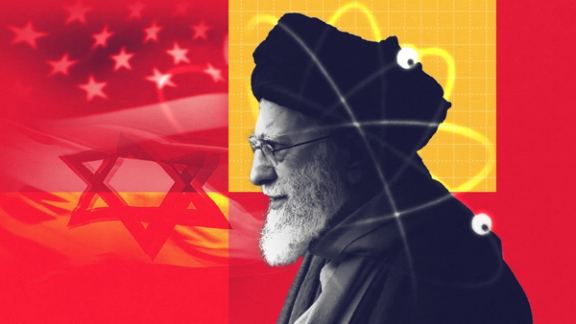
The Islamic Republic may have suffered a punishing blow in the recent 12-day war but has not backed down and may resort to assassinations, former White House official Michael Doran told Eye for Iran.
Iran's establishment is disoriented, humiliated and prone to fight back by asymmetric means now that its conventional military and regional allies have been so thoroughly degraded, said Doran, a senior fellow at the Hudson Institute thinktank.
“They're like a boxer that's been punched in the nose, fallen down on his knee on the mat, but he's getting up … they'll start assassinating people,” Doran said.
In an interview with Eye for Iran, Doran said that while Iranian officials publicly declared victory after US and Israeli strikes on its nuclear facilities, behind closed doors the Islamic Republic is in crisis.
Its most powerful military sites were struck. Its deterrence was shattered. And now, it is left with few options but through covert attacks and regional destabilization.
Supreme Leader Ali Khamenei, he added, still does not understand the full extent of Tehran's losses. “Nobody wants to be the bearer of bad news... everybody lies to their superior,” Doran said.
Doran said Tehran will turn to tactics it has long relied on including assassinations and reliance on proxy groups across the region.
Rights groups have for decades accused Tehran of killing dissidents abroad and four members of Iran-backed Hezbollah in Lebanon were indicted by an international tribunal for their alleged role in killed a former prime minister, Rafic Hariri.
“They're going to look for those lines of fissure and see where they can cause trouble,” he said. “Assassination, intimidation ... that's the program always.”
After the 12-day war, Iran is again trying to fracture emerging regional cooperation, Doran said, adding that Tehran may target figures in Lebanon, Syria or elsewhere to advance its battered interests. Doran served as Senior Director for Near East and North African Affairs at the National Security Council and later as Deputy Assistant Secretary of Defense under President George W. Bush, where he helped shape US strategy on Iran and the broader Middle East.
“If the Lebanese start moving toward normalization with Israel, they'll assassinate somebody,” he said. “They’ll assassinate al-Sharaa in Damascus,” Doran added, referring to Syria's de facto leader, an opponent of Iran.
Despite recent rhetoric about diplomacy, Doran believes US President Donald Trump remains committed to preventing a nuclear-armed Iran. “He knows that the guys across the way from him are nasty people, nasty thugs,” he said.
As Tehran regroups, Doran said the United States must maintain its pressure.
“Don't remove the sanctions,” he warned. “Iran is weak ... but they still know those techniques. And I expect them to use them.”
You can watch the full episode of Eye for Iran on YouTube or listen on any major podcast platform like Spotify, Apple, Amazon Music and Castbox.